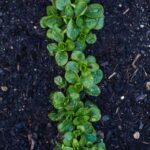Can black mulch be used in vegetable gardens to enhance the growth of your plants? Mulch is an essential component for maintaining a healthy and thriving vegetable garden. It not only helps to suppress weeds but also retains moisture and regulates temperature. In this article, we will explore the use of black mulch in vegetable gardens and evaluate its benefits, drawbacks, and best practices for application.
Black mulch is a type of gardening material that serves various purposes in vegetable gardens. Typically made from materials like plastic or rubber, black mulch is available in different forms such as sheets or shredded pieces. Its dark color absorbs heat, making it particularly effective at conserving soil moisture and regulating the temperature, creating an optimal environment for plant growth.
Using black mulch in your vegetable garden can offer numerous benefits. Beyond weed suppression and moisture retention, black mulch also helps regulate soil temperature, thereby contributing to better root development and overall plant health. However, there are potential drawbacks to consider as well – such as the heat retention properties of black mulch and its potential impact on soil pH levels.
In the following sections, we will delve deeper into the advantages and disadvantages of using black mulch in vegetable gardens, discuss how to choose the right type for your specific needs, and provide practical tips for proper application and maintenance. By understanding these key aspects of using black mulch in your vegetable garden, you can make an informed decision on whether it’s the right choice for optimizing the growth of your crops.
What Is Black Mulch
Black mulch is a popular choice for gardeners looking to improve the health and yield of their vegetable gardens. It is a type of plastic mulch that is dyed black to help retain heat, suppress weeds, conserve moisture, and regulate soil temperature. Black mulch comes in various types, including biodegradable options made from materials such as cornstarch or other organic components. There are also traditional plastic black mulches that are durable and long-lasting.
One type of black mulch commonly used in vegetable gardens is the biodegradable variety. This type of black mulch breaks down over time, adding organic matter to the soil and eliminating the need for removal at the end of the growing season. Another popular option is traditional plastic black mulch, which provides excellent weed suppression and retains heat in the soil, promoting faster growth and earlier harvests.
Choosing the right type of black mulch for your vegetable garden depends on factors such as climate, desired lifespan of the mulch, and personal preferences. Biodegradable black mulches are ideal for those looking to improve soil quality and minimize environmental impact, while traditional plastic black mulches are perfect for gardeners who prioritize durability and longevity. Understanding the different types available allows you to make an informed decision based on your specific gardening needs.
| Types of Black Mulch | Description |
|---|---|
| Biodegradable | Made from organic materials that break down over time |
| Traditional Plastic | Durable and long-lasting option for weed suppression and heat retention |
Benefits of Using Black Mulch in Vegetable Gardens
Using black mulch in vegetable gardens offers several benefits that can help promote healthy plant growth and yield a bountiful harvest. One of the main advantages of using black mulch is its ability to suppress weeds.
By creating a barrier between the soil and the surrounding environment, black mulch helps prevent weed seeds from germinating and competing with your vegetable plants for nutrients and water. This not only saves time and effort on weeding but also ensures that your vegetables have access to essential resources for their growth.
In addition to weed suppression, black mulch also aids in moisture retention. The dark color of the mulch absorbs heat from the sun, which helps to warm the soil and reduce evaporation, keeping moisture levels consistent for your vegetable plants. This is particularly beneficial during hot summer months when maintaining adequate soil moisture can be challenging. Moreover, by retaining moisture, black mulch can also help reduce the frequency of irrigation, saving water and promoting sustainable gardening practices.
Furthermore, temperature regulation is another key benefit of using black mulch in vegetable gardens. The thermal properties of black mulch help regulate soil temperature, providing a more stable environment for root development. This is especially important for heat-sensitive crops that may suffer from stress or reduced productivity due to fluctuations in temperature. By creating a conducive growing environment, black mulch can contribute to healthier, more resilient vegetable plants that are better equipped to withstand environmental stressors.
Potential Drawbacks of Using Black Mulch in Vegetable Gardens
Black mulch has numerous benefits for vegetable gardens, but it is important to consider the potential drawbacks before deciding whether to use it in your garden. While black mulch can be an effective tool for weed suppression, moisture retention, and temperature regulation, there are some factors to consider when using this type of mulch.
Heat Retention
One potential drawback of using black mulch in vegetable gardens is its ability to retain heat. While this can be beneficial in cooler climates or during the early spring months, it can also lead to overheating during hot summer weather. Certain vegetables may be sensitive to excessive heat, and the use of black mulch may exacerbate this issue.
Potential Impact on Soil pH
Another consideration when using black mulch in a vegetable garden is its potential impact on soil pH. Some types of black mulch, particularly those made from recycled materials such as tires or plastics, may contain chemicals that can leach into the soil over time. This can potentially alter the pH levels of the soil, impacting the growth and health of your vegetable plants.
It is important to carefully consider these potential drawbacks before deciding to use black mulch in your vegetable garden. By understanding these factors and taking steps to mitigate any negative effects, you can effectively harness the benefits of black mulch while minimizing its potential downsides.
Choosing the Right Black Mulch for Your Vegetable Garden
Black mulch comes in a variety of materials, including plastic, rubber, and natural materials such as straw or leaves. When choosing the right black mulch for your vegetable garden, it is essential to consider factors such as the climate in your area, the specific needs of your plants, and your personal gardening style.
One of the popular options for black mulch is plastic mulch, which helps control weeds effectively due to its ability to suppress sunlight and prevent weed growth. It also retains moisture in the soil, saving water and ensuring that your vegetables have consistent access to hydration. Another option is natural black mulch made from biodegradable materials such as straw or leaves. This type of mulch has the added benefit of enriching the soil as it decomposes over time.
When selecting black mulch for your vegetable garden, consider the temperature regulation needs of your plants. Dark-colored mulches like black plastic can cause overheating if used in excessively sunny locations, leading to potential damage to plant roots.
In these cases, a lighter-colored option may be preferable to avoid excessive heat retention in the soil. Additionally, take into account any potential impact on soil pH that certain types of black mulch may have and whether this aligns with the needs of your specific crops.
Overall, finding the right black mulch for your vegetable garden involves assessing various factors such as climate, plant requirements, and maintenance preferences. By carefully considering these aspects, you can select a black mulch that will provide optimal benefits for your individual garden while promoting healthy plant growth.
| Types | Features |
|---|---|
| Plastic Mulch | Weed suppression and moisture retention |
| Natural Materials (straw or leaves) | Biodegradable and enriches soil |
How to Apply Black Mulch in Vegetable Gardens
Black mulch can be a beneficial addition to vegetable gardens, providing numerous advantages such as weed suppression, moisture retention, and temperature regulation. When properly applied, black mulch can significantly improve the health and productivity of your vegetable plants. Here are step-by-step instructions on how to apply black mulch in a vegetable garden for maximum effectiveness:
1. Prepare the soil: Before applying black mulch, ensure that the soil in your vegetable garden is well-prepared. This includes removing any existing weeds or debris, loosening the soil to improve aeration, and adding any necessary soil amendments or fertilizers.
2. Apply a layer of organic matter: Prior to laying down the black mulch, it is beneficial to add a layer of organic matter such as compost or aged manure to the soil surface. This will help improve soil structure and fertility, providing additional nutrients for your vegetable plants.
3. Lay down the black mulch: Once the soil is prepared, carefully lay down a layer of black mulch around your vegetable plants. Make sure to spread the mulch evenly and maintain a consistent thickness throughout the garden bed. Aim for a depth of 2-3 inches to achieve optimal weed suppression and moisture retention.
4. Create planting holes: If you are applying black mulch around newly planted vegetable seedlings or transplants, create small openings in the mulch to expose the soil beneath. This will allow you to plant your vegetables directly into the soil while still benefiting from the advantages of using black mulch.
By following these step-by-step instructions for applying black mulch in your vegetable garden, you can ensure that your plants receive maximum benefits from this useful gardening technique. Proper application of black mulch can contribute to healthier, more productive vegetable plants while reducing maintenance needs and conserving water in the garden bed.
Tips for Maintaining Black Mulch in Vegetable Gardens
Maintaining black mulch in vegetable gardens is essential to ensure that it continues to provide the benefits it promises. Here are some tips on how to maintain and care for black mulch in your vegetable garden:
- Regularly check for signs of wear and tear: Over time, black mulch can break down or become compacted, which reduces its effectiveness. It is important to regularly inspect the mulch for any signs of wear and tear and replace it as needed.
- Control weed growth: Although black mulch helps suppress weed growth, some weeds may still manage to grow through. It is important to regularly remove any weeds that emerge in order to prevent them from competing with your vegetables for nutrients and moisture.
- Maintain proper moisture levels: One of the main benefits of black mulch is its ability to retain moisture in the soil. However, it is important to monitor the moisture levels in your garden and water accordingly, especially during dry periods.
In addition to these tips, it is crucial to also pay attention to the overall health of your vegetable plants. Black mulch can create a conducive environment for pests and diseases if not properly maintained. Regularly inspecting your plants for any signs of distress will help you address any issues before they escalate.
Proper maintenance of black mulch in your vegetable garden not only ensures its longevity but also maximizes its benefits for your plants. By following these simple tips, you can continue reaping the advantages of using black mulch while keeping your vegetable garden healthy and vibrant.
Case Studies and Success Stories
In conclusion, black mulch can be a beneficial addition to vegetable gardens, providing numerous advantages such as weed suppression, moisture retention, and temperature regulation. However, it is important to carefully consider the potential drawbacks of using black mulch in vegetable gardens, including heat retention and its potential impact on soil pH.
When choosing the right black mulch for your vegetable garden, it is essential to consider factors such as the type of vegetables being grown and the specific needs of your garden.
Proper application and maintenance of black mulch are also crucial for its effectiveness in a vegetable garden. Following step-by-step instructions for applying black mulch and regularly maintaining and caring for it will ensure its longevity and continued benefits. Additionally, learning from case studies and success stories of vegetable gardeners who have successfully used black mulch in their gardens can provide valuable insights and inspiration for those considering implementing this practice in their own gardens.
Overall, while there may be some considerations to keep in mind when using black mulch in vegetable gardens, with proper selection, application, and maintenance, it can be a valuable tool for improving the health and productivity of a vegetable garden. By weighing the benefits against any potential drawbacks and incorporating best practices learned from successful examples, utilizing black mulch can lead to excellent results in a vegetable garden.
Frequently Asked Questions
Can You Put Black Mulch on Vegetable Garden?
Yes, you can put black mulch on a vegetable garden. Black mulch helps to retain moisture, control weeds, and regulate soil temperature, which can be beneficial for vegetables. However, it is important to use caution with black mulch in hot climates as it can absorb heat and potentially harm the delicate roots of some plants.
Can You Put Black Mulch Around Tomato Plants?
It is possible to put black mulch around tomato plants, but it is important to take certain precautions. While black mulch can help conserve moisture and suppress weeds around tomato plants, it can also cause the soil to become excessively hot, which may negatively affect the growth of the plants.
Using a reflective or light-colored mulch may be a better option for tomatoes.
Why Not to Use Black Mulch?
There are reasons why one may not want to use black mulch in their garden. In hot climates, black mulch can absorb heat and raise the temperature of the soil too much, potentially harming plant roots.
Additionally, if not properly anchored down or covered with another layer of lighter-colored mulch or materials, black plastic mulch can release harmful toxins into the environment when exposed to sunlight for extended periods of time.

If you’re looking to get into vegetable gardening, or are just looking for some tips on how to make your current garden better, then you’ve come to the right place! My name is Ethel and I have been gardening for years. In this blog, I’m going to share with you some of my best tips on how to create a successful vegetable garden.





